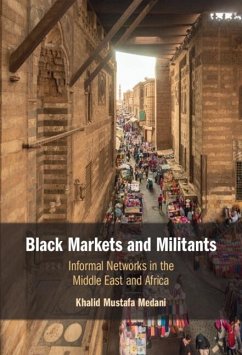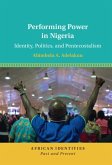Khalid Mustafa Medani
Black Markets and Militants (eBook, PDF)
Informal Networks in the Middle East and Africa
22,95 €
22,95 €
inkl. MwSt.
Sofort per Download lieferbar

11 °P sammeln
22,95 €
Als Download kaufen

22,95 €
inkl. MwSt.
Sofort per Download lieferbar

11 °P sammeln
Jetzt verschenken
Alle Infos zum eBook verschenken
22,95 €
inkl. MwSt.
Sofort per Download lieferbar
Alle Infos zum eBook verschenken

11 °P sammeln
Khalid Mustafa Medani
Black Markets and Militants (eBook, PDF)
Informal Networks in the Middle East and Africa
- Format: PDF
- Merkliste
- Auf die Merkliste
- Bewerten Bewerten
- Teilen
- Produkt teilen
- Produkterinnerung
- Produkterinnerung

Bitte loggen Sie sich zunächst in Ihr Kundenkonto ein oder registrieren Sie sich bei
bücher.de, um das eBook-Abo tolino select nutzen zu können.
Hier können Sie sich einloggen
Hier können Sie sich einloggen
Sie sind bereits eingeloggt. Klicken Sie auf 2. tolino select Abo, um fortzufahren.

Bitte loggen Sie sich zunächst in Ihr Kundenkonto ein oder registrieren Sie sich bei bücher.de, um das eBook-Abo tolino select nutzen zu können.
An explanation of why youth join militant organizations and how informal networks influence the character and objectives of social movements.
- Geräte: PC
- mit Kopierschutz
- eBook Hilfe
- Größe: 3.78MB
- FamilySharing(5)
Andere Kunden interessierten sich auch für
![European Party Politics in Times of Crisis (eBook, PDF) European Party Politics in Times of Crisis (eBook, PDF)]() European Party Politics in Times of Crisis (eBook, PDF)103,95 €
European Party Politics in Times of Crisis (eBook, PDF)103,95 €![Security Arena in Africa (eBook, PDF) Security Arena in Africa (eBook, PDF)]() Tim GlawionSecurity Arena in Africa (eBook, PDF)30,95 €
Tim GlawionSecurity Arena in Africa (eBook, PDF)30,95 €![Precolonial Legacies in Postcolonial Politics (eBook, PDF) Precolonial Legacies in Postcolonial Politics (eBook, PDF)]() Martha WilfahrtPrecolonial Legacies in Postcolonial Politics (eBook, PDF)22,95 €
Martha WilfahrtPrecolonial Legacies in Postcolonial Politics (eBook, PDF)22,95 €![Activist Origins of Political Ambition (eBook, PDF) Activist Origins of Political Ambition (eBook, PDF)]() Keith WeghorstActivist Origins of Political Ambition (eBook, PDF)26,95 €
Keith WeghorstActivist Origins of Political Ambition (eBook, PDF)26,95 €![Cost of Doing Politics (eBook, PDF) Cost of Doing Politics (eBook, PDF)]() Jane L. SumnerCost of Doing Politics (eBook, PDF)25,95 €
Jane L. SumnerCost of Doing Politics (eBook, PDF)25,95 €![Emergence and Revival of Charismatic Movements (eBook, PDF) Emergence and Revival of Charismatic Movements (eBook, PDF)]() Caitlin Andrews-LeeEmergence and Revival of Charismatic Movements (eBook, PDF)26,95 €
Caitlin Andrews-LeeEmergence and Revival of Charismatic Movements (eBook, PDF)26,95 €![Performing Power in Nigeria (eBook, PDF) Performing Power in Nigeria (eBook, PDF)]() Abimbola A. AdelakunPerforming Power in Nigeria (eBook, PDF)73,95 €
Abimbola A. AdelakunPerforming Power in Nigeria (eBook, PDF)73,95 €-
-
-
An explanation of why youth join militant organizations and how informal networks influence the character and objectives of social movements.
Dieser Download kann aus rechtlichen Gründen nur mit Rechnungsadresse in A, B, BG, CY, CZ, D, DK, EW, E, FIN, F, GR, HR, H, IRL, I, LT, L, LR, M, NL, PL, P, R, S, SLO, SK ausgeliefert werden.
Produktdetails
- Produktdetails
- Verlag: Cambridge University Press
- Erscheinungstermin: 8. September 2022
- Englisch
- ISBN-13: 9781009257756
- Artikelnr.: 70913738
- Verlag: Cambridge University Press
- Erscheinungstermin: 8. September 2022
- Englisch
- ISBN-13: 9781009257756
- Artikelnr.: 70913738
- Herstellerkennzeichnung Die Herstellerinformationen sind derzeit nicht verfügbar.
Khalid Mustafa Medani is Associate Professor in the Department of Political Science and the Institute of Islamic Studies at McGill University, where he is also Chair of the African Studies Program. He is the recipient of a Carnegie Scholar on Islam award between 2007-2009, and a Woodrow Wilson Scholarship in 2020-2021.
Part I. The Framework: Introduction; Black markets and militants: informal
networks in the Middle East and Africa; Part II. The Institutional Context
in an Era of Abundance: 1. The house the boom built: the informal economy
and Islamist politics in Egypt; 2. Investing in Islamism: labor
remittances, Islamic banking and the rise of political Islam in Sudan; 3.
Islamist versus clan networks: labor remittances, Hawwala banking and the
predatory state in Somalia; Part III. Globalization and Institutional
Change in an Era of Scarcity: 4. Economic crisis, informal institutions,
and the transformation of Islamist politics in Egypt; 5. From remittance
economy to rentier state: the rise and fall of an Islamist authoritarian
regime in Sudan; 6. State collapse, informal networks and the dilemma of
state building in Somalia; 7. The political economy of radicalization:
informal networks and the rise of an urban militant Islamism in Cairo;
Conclusions. Informal markets and the politics of identity; failed states,
the criminalization of informal networks and the global war on terrorism.
networks in the Middle East and Africa; Part II. The Institutional Context
in an Era of Abundance: 1. The house the boom built: the informal economy
and Islamist politics in Egypt; 2. Investing in Islamism: labor
remittances, Islamic banking and the rise of political Islam in Sudan; 3.
Islamist versus clan networks: labor remittances, Hawwala banking and the
predatory state in Somalia; Part III. Globalization and Institutional
Change in an Era of Scarcity: 4. Economic crisis, informal institutions,
and the transformation of Islamist politics in Egypt; 5. From remittance
economy to rentier state: the rise and fall of an Islamist authoritarian
regime in Sudan; 6. State collapse, informal networks and the dilemma of
state building in Somalia; 7. The political economy of radicalization:
informal networks and the rise of an urban militant Islamism in Cairo;
Conclusions. Informal markets and the politics of identity; failed states,
the criminalization of informal networks and the global war on terrorism.
Part I. The Framework: Introduction; Black markets and militants: informal
networks in the Middle East and Africa; Part II. The Institutional Context
in an Era of Abundance: 1. The house the boom built: the informal economy
and Islamist politics in Egypt; 2. Investing in Islamism: labor
remittances, Islamic banking and the rise of political Islam in Sudan; 3.
Islamist versus clan networks: labor remittances, Hawwala banking and the
predatory state in Somalia; Part III. Globalization and Institutional
Change in an Era of Scarcity: 4. Economic crisis, informal institutions,
and the transformation of Islamist politics in Egypt; 5. From remittance
economy to rentier state: the rise and fall of an Islamist authoritarian
regime in Sudan; 6. State collapse, informal networks and the dilemma of
state building in Somalia; 7. The political economy of radicalization:
informal networks and the rise of an urban militant Islamism in Cairo;
Conclusions. Informal markets and the politics of identity; failed states,
the criminalization of informal networks and the global war on terrorism.
networks in the Middle East and Africa; Part II. The Institutional Context
in an Era of Abundance: 1. The house the boom built: the informal economy
and Islamist politics in Egypt; 2. Investing in Islamism: labor
remittances, Islamic banking and the rise of political Islam in Sudan; 3.
Islamist versus clan networks: labor remittances, Hawwala banking and the
predatory state in Somalia; Part III. Globalization and Institutional
Change in an Era of Scarcity: 4. Economic crisis, informal institutions,
and the transformation of Islamist politics in Egypt; 5. From remittance
economy to rentier state: the rise and fall of an Islamist authoritarian
regime in Sudan; 6. State collapse, informal networks and the dilemma of
state building in Somalia; 7. The political economy of radicalization:
informal networks and the rise of an urban militant Islamism in Cairo;
Conclusions. Informal markets and the politics of identity; failed states,
the criminalization of informal networks and the global war on terrorism.







